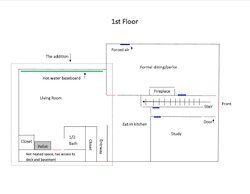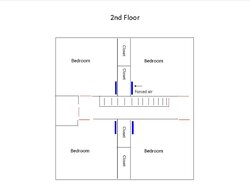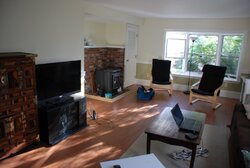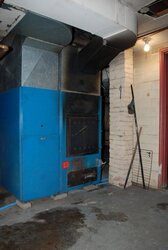I 'm in serious need of serious advice on how to proceed with replacing the central heat system in our 1930s, 3,000 sq', Colonial home we recently purchased. The house is incredibly well built and reasonably insulated, windows aside. However, heating this girl is going to be a challenge for a variety of reasons. A little background:
1. The original structure is heated by forced hot air, currently supplied by a Powrmatic combo wood/oil furnace located in the basement. It's old and tired.
2. A first-floor addition was added to the house about 20 years ago. At the same time, the attic was converted into a master suite. Both the addition and master suite are heated by hot water baseboard. A separate oil-fed boiler is responsible for these zones. This boiler is way past it's prime.
3. An Englander pellet stove resides in the first floor addition and can easily heat the living/dining room and kitchen. This, too, is not in the best shape.
4. Domestic hot water is supplied by an electric tank installed just prior to us purchasing the home. I really want a tankless hot-water unit, but we don't have NG or propane, so cost of installation is prohibitive at the moment.
I have included the 1st and 2nd floor plans indicating location of baseboard, registers and the pellet stove. The master suite is on the 3rd floor and is essentially an open room, again heated by baseboard.
With our first winter ahead of us, we're prepared to rely on the pellet stove and wood portion of the furnace for a majority of our warmth. I'd like to completely stay away from the oil boiler, not only because of cost, but because it's in such tough shape. We might need to rely on a space heater for the master bedroom, but I think enough hot air will rise that we should be OK.
Next year, I would like to replace the systems in place now, but don't know what is the best option given our budget and desire to distance ourselves from oil. Although we're in no hurry to sell this place, I want to consider "ease of use" into the equation. I love mucking about with wood stoves and the like, but the next owner might not.
Some questions:
- Is there a pellet or wood furnace that can provide forced hot air while accommodating the hot water baseboard at the same time?
- One professional opinion we received was to plumb baseboard hot water where the forced hot air currently exists and move exclusively to a boiler operation. It would be a shame to go that direction as the house has definite character with the registers. But maybe if it were not oil-based and it supplied DHW, would it make economical sense?
- In the attached floor plan, there is a fireplace in the formal dining room. Would it be possible to install a wood or pellet stove, and modify the existing ducts to distribute the heat? Given the location of the ducts and the stairs, it looks as if there will be good convection.
If you've read this far, thank you. I'm sure I've omitted about 90 percent of the story, but hopefully I've included enough to get a discussion going. Really looking forward to hearing comments, and I'm here to answer any questions and will gladly upload photos or drawing if asked.




1. The original structure is heated by forced hot air, currently supplied by a Powrmatic combo wood/oil furnace located in the basement. It's old and tired.
2. A first-floor addition was added to the house about 20 years ago. At the same time, the attic was converted into a master suite. Both the addition and master suite are heated by hot water baseboard. A separate oil-fed boiler is responsible for these zones. This boiler is way past it's prime.
3. An Englander pellet stove resides in the first floor addition and can easily heat the living/dining room and kitchen. This, too, is not in the best shape.
4. Domestic hot water is supplied by an electric tank installed just prior to us purchasing the home. I really want a tankless hot-water unit, but we don't have NG or propane, so cost of installation is prohibitive at the moment.
I have included the 1st and 2nd floor plans indicating location of baseboard, registers and the pellet stove. The master suite is on the 3rd floor and is essentially an open room, again heated by baseboard.
With our first winter ahead of us, we're prepared to rely on the pellet stove and wood portion of the furnace for a majority of our warmth. I'd like to completely stay away from the oil boiler, not only because of cost, but because it's in such tough shape. We might need to rely on a space heater for the master bedroom, but I think enough hot air will rise that we should be OK.
Next year, I would like to replace the systems in place now, but don't know what is the best option given our budget and desire to distance ourselves from oil. Although we're in no hurry to sell this place, I want to consider "ease of use" into the equation. I love mucking about with wood stoves and the like, but the next owner might not.
Some questions:
- Is there a pellet or wood furnace that can provide forced hot air while accommodating the hot water baseboard at the same time?
- One professional opinion we received was to plumb baseboard hot water where the forced hot air currently exists and move exclusively to a boiler operation. It would be a shame to go that direction as the house has definite character with the registers. But maybe if it were not oil-based and it supplied DHW, would it make economical sense?
- In the attached floor plan, there is a fireplace in the formal dining room. Would it be possible to install a wood or pellet stove, and modify the existing ducts to distribute the heat? Given the location of the ducts and the stairs, it looks as if there will be good convection.
If you've read this far, thank you. I'm sure I've omitted about 90 percent of the story, but hopefully I've included enough to get a discussion going. Really looking forward to hearing comments, and I'm here to answer any questions and will gladly upload photos or drawing if asked.






 , and our domestic hot water through and in-direct hot water heater. Love it. Oh. Congratulations on the new house and good luck on your decisions. If you decide to go with wood, it is a good idea to get started now on your supply. A little at a time makes it easier than trying to do it all at once. The gassers like dry wood. Seasoned longer than a year is best. Longer than two if it is oak, from what the others on the forums have said. If you do not have the time to devote to the work of wood, the pellet boiler would be easier, cleaner, and take less time. I came very close to a pellet boiler. But wood is cheaper, especially if you have access to some, can spend some time scrounging, etc. Buying it all cut, split, and delivered is great if you have a little extra money. I do this from time to time. You get all the benefits of cord wood, without all the extra stuff (tools, time, fuel, etc. etc.) you have to have and do with cutting your own. Keep asking questions. Great bunch of guys on here that will help you out. Later.
, and our domestic hot water through and in-direct hot water heater. Love it. Oh. Congratulations on the new house and good luck on your decisions. If you decide to go with wood, it is a good idea to get started now on your supply. A little at a time makes it easier than trying to do it all at once. The gassers like dry wood. Seasoned longer than a year is best. Longer than two if it is oak, from what the others on the forums have said. If you do not have the time to devote to the work of wood, the pellet boiler would be easier, cleaner, and take less time. I came very close to a pellet boiler. But wood is cheaper, especially if you have access to some, can spend some time scrounging, etc. Buying it all cut, split, and delivered is great if you have a little extra money. I do this from time to time. You get all the benefits of cord wood, without all the extra stuff (tools, time, fuel, etc. etc.) you have to have and do with cutting your own. Keep asking questions. Great bunch of guys on here that will help you out. Later.